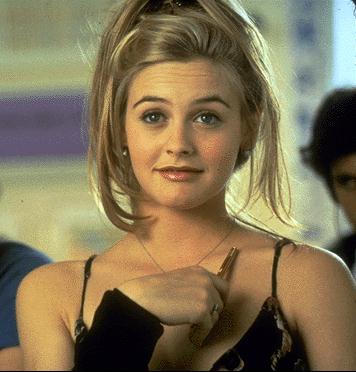 Alicia Silverstone in Clueless
Alicia Silverstone in Clueless
Film Friday
I’m currently preparing to teach a first year seminar on “Jane Austen and the Challenges Faced by Regency Teenagers.” For years it didn’t strike me forcefully enough that most of Jane Austen’s heroines are either teenagers or recent teenagers. That’s because (1) Austen heroines seem fully adult and (2) adolescence as we think of it is a fairly recent phenomenon. (Sociologists trace modern adolescence to the 1950s.)
The film that opened my eyes to the teenage dimension of Austen was Amy Heckerling’s Clueless. Previous to 1995, which is when the film came out, I would have said it was impossible to translate a Jane Austen classic to Valley Girl culture. But Heckerling pulls it off in what I think is one of the most successful Austen adaptations.
Normally I resist film versions of books that I love. Someone—I don’t know who—once said that one could make a great movie out of a mediocre book but that it was impossible to make a great movie out of a great book. That strikes me as fairly true, and even those impressive movies that challenge this observation–say, Ken Russell’s Women in Love or Tony Richardson’s Tom Jones—don’t deserve a place amongst cinema’s greatest films. The same can be said of Clueless.
But all three movies are very smart, and I admire the conversation that each has with the original book. So here’s turning to the teenpic version of Emma.
Emma is currently my favorite Austen novel (for a long while it was Pride and Prejudice and, after that, Persuasion). I find the heroine to be an amazing creation, one who it is difficult to like at first (as Austen knew she would be) and yet who emerges from a series of self-inflicted mortifying experiences to grow into someone altogether admirable. The themes of power and knowledge intertwine throughout the book, and at one key point Emma comes face to face with the consequences of her actions. She realizes that she has set her friend Harriet up to fall in love with Knightley, who she herself (she suddenly discovers) loves. Nevertheless, she heroically resigns him.
The movie provides particular pleasures for those who know the book because we can watch what Heckerling does to transform it into a teenpic. It’s easy enough to have Cher living at home with her single father. It’s surprisingly easy to give her Emma’s sense of class superiority; classes in 18th century England become cliques in a modern high school.
But what are we to do with the secret engagement between Frank Churchill and Jane Fairfax, given that such engagements are not to be found in today’s high schools? In Austen’s romance, Frank is the logical mate for Emma, who can’t understand why he resists her charms. Heckerling outdoes herself here: she makes the character gay.
The film seems to end with a marriage, which again would violate teenpic conventions. Only it’s not Cher and Josh walking down the aisle but the two teachers whose marriage Cher orchestrated at the beginning of the film. “AS IF!” we hear Cher saying in a voiceover. “I am only 16, and this is California, not Kentucky.”
Emma is 20 but she becomes more sympathetic if one thinks of her as a cocky teenager who must learn to grow up—and who does. The good news is that, because she has received good moral instruction and possesses a good heart, she comes out all right. It’s a combination that still works.

